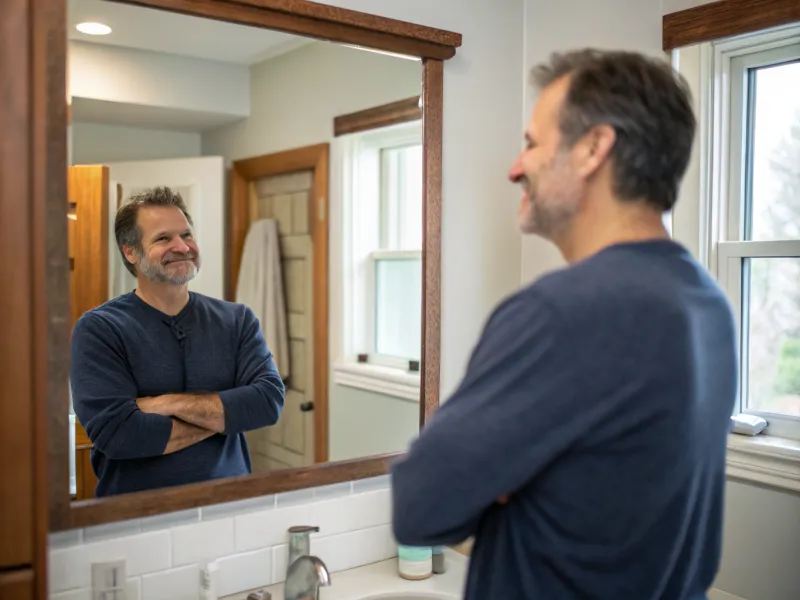34 Red Flags That Suggest A Man’s Relationships Are Doomed To Fail
Let’s not sugarcoat it: some guys just aren’t cut out for long-term relationships. Maybe it’s because of ingrained habits or a lack of self-awareness, but certain behaviors all but guarantee failure when it comes to love.
As a man who’s either been there, learned the hard way, or seen others walk the same path, I’ve compiled a list of 34 red flags that scream a relationship is going nowhere fast.
If you recognize these in yourself or someone you’re dating, it might be time to take a step back and reevaluate what’s really going on.
1. Blaming Every Breakup on Exes

It’s easy to point fingers when a relationship ends, but if you find yourself consistently blaming your exes, it’s time to pause and reflect. Taking responsibility is a mark of maturity. Relationships are partnerships, and failures are rarely one-sided. Avoiding self-reflection after a breakup not only stunts personal growth but also sets a pattern where you’ll repeat the same mistakes, expecting different results.
Every relationship is a learning opportunity. When you fail to acknowledge your part in its demise, you’re missing out on valuable lessons. This blaming behavior isn’t just toxic for your personal development; it also signals to new partners that you lack the emotional intelligence necessary for a healthy relationship.
Instead of pointing fingers, consider what actions you took—or didn’t take—that contributed to the breakup. This kind of introspection shows humility and a willingness to grow. Owning your mistakes helps build a solid foundation for future relationships. Aim to evolve and leave behind the habit of playing the blame game. Acknowledge that it takes two to tango, and sometimes you need to own up to your missteps to avoid repeating them.
2. Jumping from One Relationship to Another

Serial dating might seem exciting, but jumping from one relationship to another without taking time to reflect is a red flag. It suggests an avoidance of solitude and self-assessment. The truth is, constant companionship doesn’t address underlying personal issues. It’s vital to understand why past relationships didn’t work before entering new ones.
Taking time between relationships to heal and grow is crucial for personal development. This period allows you to process emotions, learn from past mistakes, and make necessary changes. Avoiding alone time can indicate a fear of self-confrontation, which is essential for emotional maturation.
A healthy relationship with yourself is the foundation for a healthy partnership with someone else. By rushing into new relationships, you risk dragging unresolved issues from the past into your future. If you want your next relationship to succeed, embrace the space for reflection and self-improvement. Understand that being alone doesn’t mean being lonely—it’s an opportunity to better prepare for a meaningful connection.
3. Avoiding Deep Conversations

When emotions surface, and you find yourself changing the subject or dodging the discussion, it’s a red flag. Avoiding deep conversations may seem like self-preservation, but it hinders intimacy and trust. Relationships thrive on vulnerability and honest communication, and sidestepping serious talks can cause emotional disconnect.
Intimacy is built on more than just shared experiences; it’s about understanding each other’s dreams, fears, and values. By avoiding these conversations, you’re limiting the depth of your relationship. It shows an unwillingness to open up or explore the emotional landscape of your partnership.
Addressing feelings directly can be uncomfortable, but it’s necessary for growth. Practice active listening and engage genuinely with your partner’s emotions. By fostering open dialogue, you create a safe space where both of you can express yourselves freely. This level of communication strengthens bonds and prepares you both for the challenges any relationship may bring. Don’t let fear of discomfort keep you from building a truly meaningful connection.
4. Expecting a Woman to ‘Fix’ Him

Expecting a partner to ‘fix’ you is unrealistic and unfair. Relationships aren’t therapy sessions. While partners can offer support, they shouldn’t bear the burden of solving your personal issues. This expectation can lead to resentment and imbalance in the relationship, making it destined to fail.
Self-improvement is a personal journey. Placing your growth in someone else’s hands not only undermines your autonomy but also places undue pressure on your partner. It’s essential to take responsibility for your own emotional and psychological health if you want a relationship to thrive.
Partners are meant to complement each other, not complete each other. Focus on personal development and seek professional help if needed. By working on yourself, you contribute positively to the relationship, making it stronger and more balanced. Remember, a healthy relationship is built on mutual support, not dependency. Aim to stand on your own two feet, so you can walk alongside someone, not lean on them.
See also: 25 Red Flags Of Men Whose Relationships Never Last
5. Believing Emotional Unavailability is Attractive

There’s a myth that being emotionally unavailable makes a man mysterious or desirable. In reality, it creates barriers that prevent genuine connection. Emotional unavailability signals a lack of readiness for commitment and can lead to misunderstandings and unmet needs in a relationship.
Emotional availability is crucial for forming deep, meaningful bonds. If you think being detached is appealing, you’re likely avoiding vulnerability out of fear of getting hurt. This approach keeps relationships superficial and unsatisfying, as it prevents the level of intimacy necessary for growth.
Challenge the belief that being closed off is attractive. Open up and allow yourself to be vulnerable; this is how true connections are made. Engage with your partner at an emotional level, sharing thoughts and feelings openly. This honesty fosters trust and strengthens the relationship, paving the way for a lasting partnership based on mutual understanding and support.
6. Seeking Validation from Multiple Women

Seeking validation from multiple women while in a relationship is a dangerous red flag. It indicates a lack of self-confidence and an inability to find self-worth internally. This behavior is not only disrespectful to your partner but also reveals a fear of commitment and a tendency to sabotage relationships.
Relying on external validation undermines the foundation of trust and loyalty required for a healthy relationship. It distracts from the effort needed to nurture your current partnership and can lead to emotional infidelity, creating a rift between you and your partner.
To build a strong relationship, focus on self-acceptance and confidence. Understand that validation should come from within, not from others. Commit to appreciating and valuing your partner, showing them respect and attention. By doing this, you lay the groundwork for a more fulfilling and stable relationship, free from the need for constant external approval.
7. Prioritizing Ego Over Compromise

When pride takes precedence over the well-being of the relationship, it’s a troubling sign. Prioritizing ego over compromise means you’re unwilling to meet your partner halfway, which is essential for resolving conflicts and maintaining harmony.
Effective communication and compromise are key components of any successful relationship. Holding onto your pride rather than working towards a resolution creates distance and breeds resentment. It shows a lack of consideration for your partner’s feelings and needs.
To foster a healthy relationship, practice humility and actively seek solutions that benefit both parties. Recognize that being right isn’t as important as being understanding. Embrace compromise as a strength, not a weakness. This approach helps build a relationship grounded in respect and cooperation, ensuring both partners feel valued and heard.
8. Refusing to Grow and Change

Stubbornly sticking to old habits and refusing to evolve can doom any relationship. Growth is a natural part of life, and relationships require adaptability to thrive. When a man resists change, he signals an unwillingness to invest in the future of the partnership.
Personal development is crucial for a relationship’s success. Refusing to change indicates comfort in complacency, which can lead to dissatisfaction and a lack of fulfillment for both partners. It may also suggest fear of the unknown or a reluctance to face personal flaws.
Embrace change as an opportunity for growth. Be open to new experiences and perspectives that can enrich your relationship. Demonstrate a willingness to adapt and improve not just for your partner, but for yourself. This proactive approach ensures that the relationship evolves positively, fostering a dynamic and rewarding partnership.
9. Ignoring Personal Boundaries

Disregarding personal boundaries is a major red flag. It demonstrates a lack of respect and understanding for your partner’s autonomy and privacy. Healthy relationships are built on mutual respect, and ignoring boundaries erodes trust.
Boundaries are essential for maintaining individuality within a partnership. By crossing these lines, you not only disrespect your partner but also create an environment where they might feel unsafe or undervalued. It’s crucial to recognize and honor your partner’s personal space and limits.
To cultivate a respectful relationship, communicate openly about boundary expectations. Practice empathy by considering your partner’s feelings and comfort levels. Respect their space, time, and privacy as you would want yours to be respected. This mutual understanding strengthens the relationship, making it more supportive and nurturing for both parties involved.
10. Being Overly Jealous or Possessive

Jealousy and possessiveness often mask deeper insecurities and can be incredibly destructive in a relationship. This behavior signals a lack of trust and confidence, both in the relationship and in oneself. Left unchecked, it can lead to controlling behavior that suffocates the partnership.
Trust is the cornerstone of any healthy relationship. When jealousy takes over, it undermines this foundation, leading to suspicion and conflict. It’s important to address these feelings and understand their roots, rather than projecting them onto your partner.
Cultivating trust requires open communication and self-reflection. Work on building your self-esteem and addressing insecurities independently. Encourage honest dialogue with your partner to alleviate misunderstandings and reaffirm trust. By doing so, you create a more secure and supportive environment where love can flourish without the shadow of jealousy.
11. Lacking Ambition or Drive

A lack of ambition can be a deal-breaker in relationships. It signals a complacent attitude toward personal growth and future planning. Without drive or goals, a relationship can stagnate, leaving both partners feeling unfulfilled and uninspired.
Ambition is not just about career or financial success; it’s about striving for betterment in all areas of life. When one partner lacks this drive, it can create an imbalance, causing frustration and disappointment in the relationship. It may also indicate a reluctance to contribute equally to the partnership’s growth.
Encourage each other to set and pursue goals, fostering a supportive environment for personal and mutual growth. Inspire each other to dream big and work towards those dreams together. This shared ambition strengthens the bond, creating a dynamic and exciting future for both partners. Remember, growth is a journey best traveled together, with each partner actively contributing to the path forward.
12. Displaying Emotionally Abusive Behavior

Emotionally abusive behavior is a significant red flag that can cause severe harm to a relationship. It involves manipulation, intimidation, and emotional blackmail, leaving the other partner feeling powerless and unworthy. This toxic behavior is not only destructive but also deeply damaging to emotional health.
Emotional abuse is often subtle and can be difficult to recognize at first. It may involve belittling, constant criticism, or controlling behavior that erodes a partner’s self-esteem. This not only damages the relationship but also the emotional well-being of the person being abused.
Recognizing and addressing these behaviors is crucial. Seek professional help if necessary to change abusive patterns and learn healthier ways of interacting. A safe and loving relationship is built on respect and equality, not control and fear. Acknowledge the harm done and commit to fostering a nurturing environment where both partners feel valued and respected.
13. Refusing to Prioritize the Relationship

A relationship should be a top priority, not an afterthought. When a man consistently puts work, hobbies, or other interests above the relationship, it signals a lack of commitment. This neglect can lead to feelings of isolation and resentment from the partner, ultimately weakening the bond.
Prioritizing a relationship requires effort and dedication. It means being present and engaged, showing your partner that they are important and valued. When other aspects of life consistently take precedence, it creates an imbalance that can be difficult to rectify.
To strengthen the relationship, make a conscious effort to prioritize your partner. Set aside quality time together and be fully present during interactions. Show appreciation and actively participate in nurturing the relationship. By doing this, you demonstrate commitment and reinforce the importance of the partnership, ensuring it remains a fulfilling and central part of your life.
14. Showing Contempt for a Partner’s Interests

Contempt for a partner’s interests is a critical red flag. It reveals a lack of respect and appreciation for what makes your partner unique. Disparaging their hobbies or passions not only alienates them but also reflects poorly on your ability to empathize and support.
Respecting each other’s interests is vital for a healthy relationship. It shows that you value your partner’s individuality and are willing to share in their joy. When you dismiss or belittle their passions, it creates emotional distance and undermines trust.
Foster a sense of curiosity and support for your partner’s interests. Engage in conversations about their hobbies and show genuine interest. Encourage and participate where possible, even if only to show support. This effort strengthens the emotional connection and enriches the relationship, creating a more inclusive and harmonious partnership.
15. Making Insults a Habit

Habitual insults erode the foundation of any relationship. They signal disrespect and a lack of empathy, damaging trust and emotional safety. When insults become a norm, they create an environment where open communication and emotional intimacy cannot thrive.
Even in jest, insults can have a lasting impact, chipping away at self-esteem and creating emotional distance. This behavior often masks deeper insecurities or unresolved conflicts, projecting negativity onto the partner instead of addressing the underlying issues.
To foster a healthier relationship, replace insults with constructive communication. Focus on expressing feelings and concerns without resorting to hurtful language. Practice active listening and empathy, creating a space where both partners feel valued and respected. This approach helps rebuild trust and encourages a more positive, supportive dynamic.
16. Living in the Past

Clinging to the past can hinder the growth of a relationship. It suggests an inability to move forward and embrace new experiences. Holding onto past grievances or nostalgia prevents you from fully engaging with your partner in the present.
Living in the past creates a barrier to personal and relational growth. It can lead to comparisons with previous partners or situations, unfairly impacting the current relationship. This behavior signals a reluctance to embrace change and an avoidance of the challenges that come with growth.
Focus on the present and future by letting go of past attachments. Engage in activities that foster new memories and experiences with your partner. This shift in focus encourages growth, allowing the relationship to evolve and flourish. Embrace change as an opportunity to create a vibrant and fulfilling partnership, free from the shadows of the past.
17. Avoiding Accountability for Actions

Avoiding accountability is a significant red flag. It indicates an unwillingness to acknowledge mistakes and learn from them. This behavior fosters resentment and mistrust, as it shifts blame and avoids responsibility.
Taking accountability is crucial for personal and relational growth. It demonstrates maturity and a willingness to improve. By accepting responsibility for actions, you create an environment where open communication and problem-solving can thrive.
Cultivate accountability by acknowledging mistakes and working towards solutions. Approach conflicts with a mindset of understanding and growth. This shift not only strengthens the relationship but also builds trust and respect, laying a solid foundation for a more harmonious partnership.
18. Ignoring the Importance of Romantic Gestures

Romantic gestures are essential for keeping the spark alive in a relationship. Ignoring their importance signals complacency and a lack of effort to maintain the connection. These gestures, however small, communicate love and appreciation, nurturing emotional intimacy.
When gestures are absent, it can lead to feelings of neglect and undervaluation, causing emotional distance. Romantic gestures are not about grand displays but about showing your partner that they are cherished and valued regularly.
Incorporate thoughtful gestures into your routine, such as leaving a sweet note or planning a surprise date. These actions demonstrate care and consideration, reinforcing the emotional bond. By making an effort to express affection, you enrich the relationship, ensuring it remains vibrant and fulfilling.
19. Being Financially Irresponsible

Financial irresponsibility can strain a relationship significantly. It reflects poor planning and a lack of foresight, creating stress and tension between partners. When financial matters are mismanaged, it can lead to arguments and a lack of trust.
Responsible financial habits build a solid foundation for a relationship. They demonstrate reliability and a commitment to shared goals. Ignoring this aspect can result in unresolved conflicts and hinder the partnership’s growth.
To foster financial stability, practice transparency and communication about financial matters. Set shared goals and work collaboratively towards achieving them. This approach not only alleviates stress but also strengthens the partnership, creating a secure environment for both partners to thrive.
20. Refusing to Let Go of Control

The need for control can stifle a relationship. It reflects insecurities and a lack of trust in the partnership. When one partner insists on being in control, it creates an imbalance that can lead to resentment and conflict.
Healthy relationships require balance and mutual respect. The refusal to relinquish control suggests a fear of vulnerability and a reluctance to share decision-making. This behavior can create an environment where one partner feels stifled and undervalued.
Cultivate a sense of equality by sharing control and decision-making responsibilities. Embrace vulnerability and trust your partner’s capabilities. This shift not only fosters a more balanced relationship but also strengthens the bond, creating a partnership based on respect and collaboration.
21. Exhibiting Narcissistic Tendencies

Narcissistic tendencies can be detrimental to a relationship. They manifest as self-centeredness and a lack of empathy, making it difficult to maintain a healthy connection. This behavior often results in one partner feeling undervalued and dismissed.
A relationship requires empathy and understanding. Narcissism creates barriers to these essential components, leading to emotional distance. It reflects an inability to prioritize the partner’s needs and a focus solely on self-gratification.
Challenge narcissistic behaviors by practicing empathy and self-awareness. Focus on understanding your partner’s feelings and needs, fostering open communication. This approach not only strengthens the relationship but also promotes personal growth, creating a more fulfilling and harmonious partnership.
22. Having Unrealistic Expectations

Unrealistic expectations can set a relationship up for failure. They create pressure and dissatisfaction, making it difficult for a partner to meet these demands. This behavior often reflects a lack of understanding and acceptance of human imperfections.
A relationship thrives on realistic expectations and mutual support. Holding onto idealized notions prevents genuine connection and growth. It often leads to disappointment and frustration when expectations are unmet.
Embrace realism by appreciating your partner’s unique qualities and imperfections. Set achievable goals and communicate openly about needs and desires. This approach fosters a supportive and loving environment, where both partners feel valued and understood, paving the way for a lasting and satisfying relationship.
23. Avoiding Conflict Resolution

Avoiding conflict resolution is a red flag that indicates fear of confrontation. It signals an inability to address issues constructively, leading to unresolved conflicts and emotional distance. This behavior often stems from a desire to maintain peace at the expense of growth and understanding.
Healthy conflict resolution is essential for relationship growth. Avoidance creates resentment and prevents the partnership from evolving. It reflects a lack of communication skills and an unwillingness to face challenges head-on.
Foster open dialogue by addressing conflicts directly and calmly. Practice active listening and empathy, focusing on finding solutions rather than assigning blame. This approach not only resolves issues but also strengthens the relationship, creating a more resilient and supportive partnership.
24. Neglecting Emotional Needs

Neglecting emotional needs is a significant red flag. It indicates a lack of empathy and understanding, causing emotional disconnect. When one partner’s needs are consistently ignored, it creates a sense of isolation and undervaluation.
Emotional support is crucial for a healthy relationship. Ignoring these needs leads to dissatisfaction and resentment, hindering the partnership’s growth. It signals an inability to prioritize the partner’s well-being and a focus on self-interest.
Cultivate emotional attunement by actively engaging with your partner’s feelings and concerns. Practice empathy and show appreciation, reinforcing the emotional bond. This approach strengthens the relationship, creating a nurturing and supportive environment where both partners feel valued and understood.
25. Displaying Passive-Aggressive Behavior

Passive-aggressive behavior is a red flag that indicates unresolved anger and a lack of direct communication. It manifests as sarcasm, silent treatment, or backhanded compliments, creating confusion and emotional distance in the relationship.
This behavior reflects an inability to express emotions constructively, leading to misunderstandings and resentment. It prevents open dialogue and hinders the relationship’s growth, creating an environment where issues remain unresolved.
Address passive-aggressive tendencies by practicing open and honest communication. Express feelings directly and constructively, focusing on resolution rather than blame. This approach fosters a more supportive and understanding relationship, encouraging growth and emotional intimacy.
26. Failing to Appreciate a Partner

Failing to appreciate a partner is a major red flag. It signals complacency and a lack of gratitude, undermining the relationship’s foundation. When appreciation is absent, it creates feelings of neglect and undervaluation, damaging the emotional bond.
Gratitude is essential for a healthy relationship. It shows that you value your partner’s efforts and contributions. Without it, the relationship can become stale and unfulfilling, leading to dissatisfaction and resentment.
Cultivate appreciation by acknowledging your partner’s efforts and expressing gratitude regularly. Celebrate small gestures and achievements, reinforcing the emotional connection. This approach strengthens the relationship, creating a more positive and fulfilling partnership where both partners feel valued and cherished.
27. Displaying Unresolved Trauma or Issues

Unresolved trauma can heavily impact a relationship. It manifests as emotional withdrawal, trust issues, or erratic behavior, creating instability. This unresolved pain often projects onto the partner, damaging the relationship’s foundation.
Addressing past trauma is crucial for relational and personal growth. Without healing, it creates barriers to emotional intimacy and understanding, preventing the relationship from thriving. It reflects a need for self-awareness and professional assistance.
Seek healing through therapy or support groups, addressing unresolved issues constructively. Communicate openly with your partner about your struggles, fostering empathy and support. This approach not only strengthens the relationship but also promotes individual growth, paving the way for a more secure and fulfilling partnership.
28. Exhibiting Overcritical Behavior

Being overly critical is a red flag that can erode a relationship. It signals a lack of acceptance and empathy, creating an environment where the partner feels undervalued and disrespected. This behavior often masks personal insecurities and perfectionism.
Constructive feedback is valuable, but persistent criticism undermines self-esteem and emotional safety. It prevents open communication and authentic connection, hindering the relationship’s growth.
Foster a more supportive relationship by practicing empathy and focusing on positive reinforcement. Celebrate strengths and achievements, offering constructive feedback in a nurturing manner. This approach not only strengthens the relationship but also creates a more positive and empowering dynamic, fostering mutual respect and understanding.
29. Having Poor Communication Skills

Poor communication skills can be detrimental to a relationship. They lead to misunderstandings, unresolved conflicts, and emotional distance. Effective communication is the cornerstone of a healthy partnership, fostering understanding and connection.
When communication falters, it signals a lack of openness and empathy. It prevents the relationship from evolving and addressing challenges constructively. This red flag reflects a need for personal growth and a willingness to improve interaction skills.
Improve communication by practicing active listening and expressing thoughts clearly and respectfully. Engage in open dialogue, focusing on understanding and resolution. This approach strengthens the relationship, creating a more supportive and connected partnership where both partners feel heard and valued.
30. Refusing to Address Substance Abuse

Substance abuse is a serious red flag that can destroy a relationship. It indicates a lack of control and self-awareness, creating instability and mistrust. This behavior often leads to emotional and physical harm, damaging the relationship’s foundation.
Addressing substance abuse is crucial for personal and relational health. Ignoring the issue prevents healing and growth, creating an environment where the partner feels unsafe and unsupported.
Seek help through therapy or support groups, addressing substance abuse constructively. Communicate openly with your partner about your struggles, fostering empathy and support. This approach not only strengthens the relationship but also promotes individual growth and recovery, paving the way for a healthier and more fulfilling partnership.
31. Being Dismissive of a Partner’s Feelings

Being dismissive of a partner’s feelings is a significant red flag. It signals a lack of empathy and understanding, creating an emotional disconnect. When feelings are dismissed, it leads to dissatisfaction and resentment, undermining the relationship’s foundation.
Emotional validation is crucial for a healthy relationship. Ignoring a partner’s concerns reflects a focus on self-interest and an inability to prioritize their well-being.
Foster empathy by actively listening and acknowledging your partner’s feelings. Practice emotional validation and open communication, reinforcing the emotional bond. This approach strengthens the relationship, creating a nurturing and supportive environment where both partners feel valued and understood.
32. Relying on Deception

Deception is a critical red flag that can severely damage a relationship. It signals a lack of trust and honesty, creating an unstable foundation. When deception becomes a habit, it leads to suspicion and emotional distance.
Truth and transparency are essential for a healthy relationship. Deception undermines these values, leading to unresolved conflicts and dissatisfaction. It reflects a lack of respect and consideration for the partner’s feelings.
Cultivate honesty by practicing transparency and open communication. Build trust by being truthful and reliable, fostering a more supportive and understanding relationship. This approach not only strengthens the partnership but also creates a more secure and fulfilling dynamic, where both partners feel valued and respected.
33. Obsessive Gaming Habits

When gaming becomes more than just a hobby, it can spell trouble in relationships. A partner who prioritizes virtual worlds over real-life interactions may lead to feelings of neglect.
Gaming addiction, while providing temporary escape, can create emotional distance between partners. It’s essential to balance leisure activities with quality time together.
Did you know excessive gaming can affect sleep patterns? This, in turn, affects mood and attentiveness, critical components in a healthy relationship.
34. Excessive Social Media Usage

Social media can enhance connectivity, but overuse may harm relationships. A partner glued to their phone during shared moments might foster feelings of invisibility.
When likes and comments become validation sources, it may indicate deeper insecurity issues. This behavior can erode trust and intimacy over time.
Research shows that social media can lead to unrealistic relationship comparisons. It’s vital to maintain a healthy digital-life balance for relationship sustainability.





